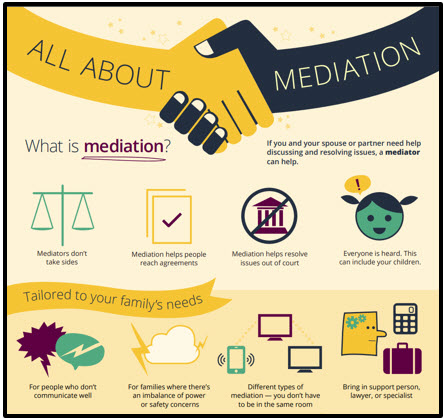Updated May 2021
Lower mainland lawyers are offering free mediation services to some families with family law disputes at the Richmond and Robson Square courthouses. If you do not reach an agreement at a Family Management Conference and you meet certain criteria, the judge may refer you to this free service.
Vancouver lawyer Dinyar Marzban began the service in the BC Supreme Court in 2012 in an effort to help separating families and make a contribution to improving their access to justice. Over the years, the service has expanded to include cases in the Vancouver and New Westminster Supreme Court locations, then to Provincial Court in Vancouver, and now Richmond. The program is now managed by lawyer Jane Reid of Marzban Jenkins Logan LLP. Today, there are 23 lawyers who are certified mediators on her list of volunteers.
Who is eligible for the free service?
To qualify for up to four hours of free mediation:
- You must be involved in family court proceedings in the BC Provincial Court at the Vancouver (Robson Square) or Richmond courthouse.
- You must be participating voluntarily.
- Either you or the other party or both must be self-represented (you must be handling your own case in court, without a lawyer). If one party does have a lawyer, the lawyer may attend the mediation.
- Your combined income must be less than $100,000 a year.
- If child or spousal support is an issue, you must bring a completed financial statement and/or your last three income tax returns and/or last three pay stubs to the mediation.
- If you or the other party need an interpreter to speak or understand English you must bring them to the mediation.
- The mediator must be satisfied that domestic violence is not an issue and that your case is suitable for mediation.
What issues can be resolved in the mediation?
The mediators will work with a qualifying family to resolve all their family law disputes – parenting arrangements, support and other financial issues, division of property etc. Even though the Provincial Court does not deal with divorce and division of property, the mediators will try to help you reach an agreement on those issues if time permits.

How do you apply for free mediation?
People who bring family law disputes to Provincial Court attend a Family Management Conference with a judge as their first court appearance. At the Family Management Conference the judge tries to help you agree on some or all of the issues you have with the other party.
If you do not resolve all your issues at the Family Management Conference the judge may invite you to fill out an application form for the free service. If that doesn’t happen, you can ask the judge if you may fill out the form.
Your application is then sent to the mediation service. They will contact you to let you know whether you have been accepted for free mediation. If you’re accepted they will make an appointment for you and the other party to attend.
Conclusion
People are often more satisfied with outcomes they agree on than with decisions imposed by a third party, even when the third party is a judge. When people involved in a family law dispute have equal power, BC laws encourage them to try to reach an agreement rather than proceed to trial. This not only maintains people’s control over decision making but avoids the escalation of hostility that often accompanies court proceedings. This free service offers eligible families the chance to resolve all aspects of their family law disputes through mediation – and any issues not resolved can still be brought to court if necessary.
Infographic courtesy of Legal Aid BC

